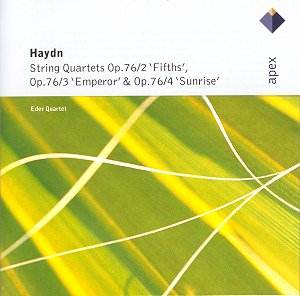The end of the eighteenth century were rich years as far as
Haydn’s output of string quartets was concerned. The decade of the 1790s
alone saw Opp.71, 74 and the six comprising Op.76 of which half are played
here. It was also during the time of his composition of the oratorio The
Creation, which makes it a rich period indeed. Where Beethoven’s final
quartets would be testing to both players and audiences alike (and right
up to the present day too), Haydn’s may have tested his players but the
music was immediately appreciated by its audiences, so much so that three
of them were given nicknames at once. The set of six was dedicated to
the Hungarian Count Erdödy. Haydn’s thematic invention never deserted
him, surely a sign that he was one of the great composers, who never suffered
from burn-out at the end of their creative lives. The first of the three
featured on the disc is called ‘Fifths’ because of the opening four notes
on the first violin, two pairs of falling fifths, an interval which invites,
and gets, the fullest contrapuntal treatment as the movement develops.
If the first two movements manifest a tender calm, the minuet (again contrapuntal
but this time a protracted canon) attracted the label ‘Witches’ or ‘Nightwatchman’s’
minuet with its rather pallid tensions, while the finale goes off into
the realms of Hungarian or Slovenian folk dance.
The central focus of Op.76 No.3 is the famous set of
four variations on the Imperial theme, later adopted as the Austrian
national anthem ‘Gott erhalte Franz der Kaiser’, which in the course
of time was twisted to ‘Deutschland, Deutschland über alles’. As
in the case of Wagner, one can’t blame Haydn for being espoused by Hitler
years after his death. Apparently it was as a result of hearing the
British ‘God save the King’, when he was in London, which inspired Haydn
to this music. The start of Op.76 No.4 certainly has a rising, golden
timbre to its tuneful start, the sunrise to a bustling day of the ‘Allegro
conspirito’.
These are excellent performances by the Eder Quartet,
not a group with which I am familiar, recorded nearly two decades ago
in Vienna. They are not a group who devolve responsibility onto the
first violin alone, both the violist and cellist (none is named in the
biography-lacking booklet) seize every solo with eagerness and intensity.
There is the occasional hard-toned attack, usually the result of well-meaning
enthusiasm, but generally the players are very conscious of style and
very sensitive to the mood of the moment. Despite facing tough competition
from the excellent recordings made by the Kodály Quartet on the
Naxos label, this glorious music is worth hearing as played here by
the Eder Quartet.
Christopher Fifield
|
